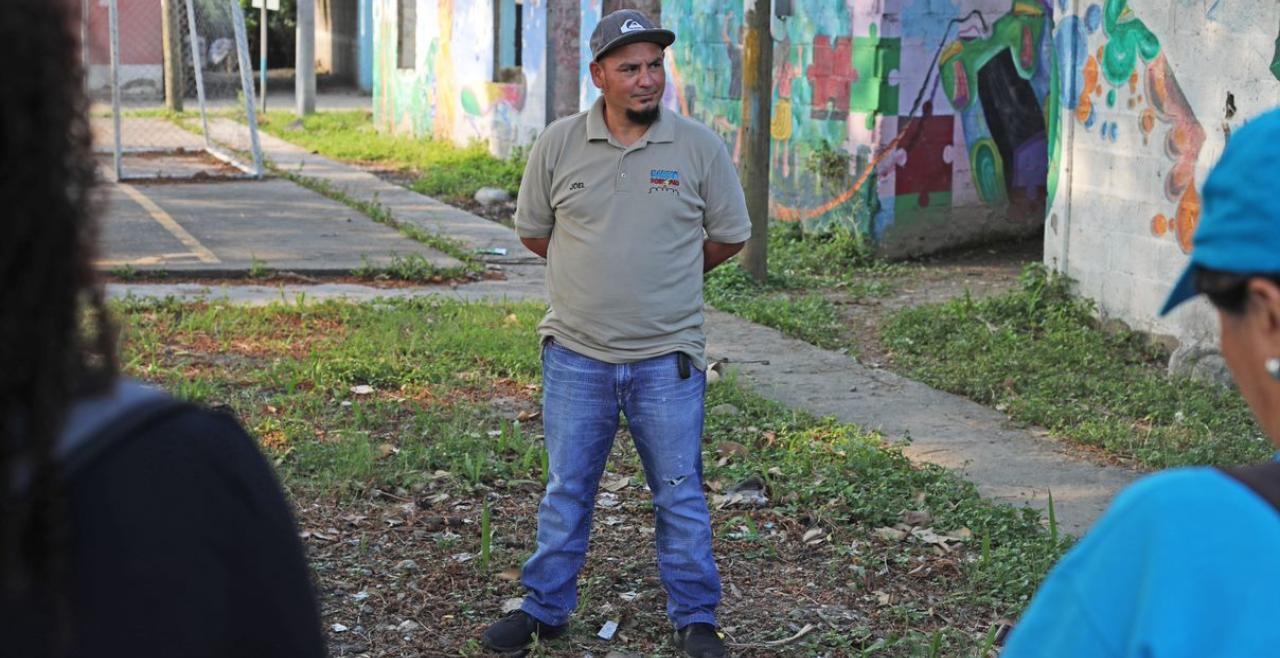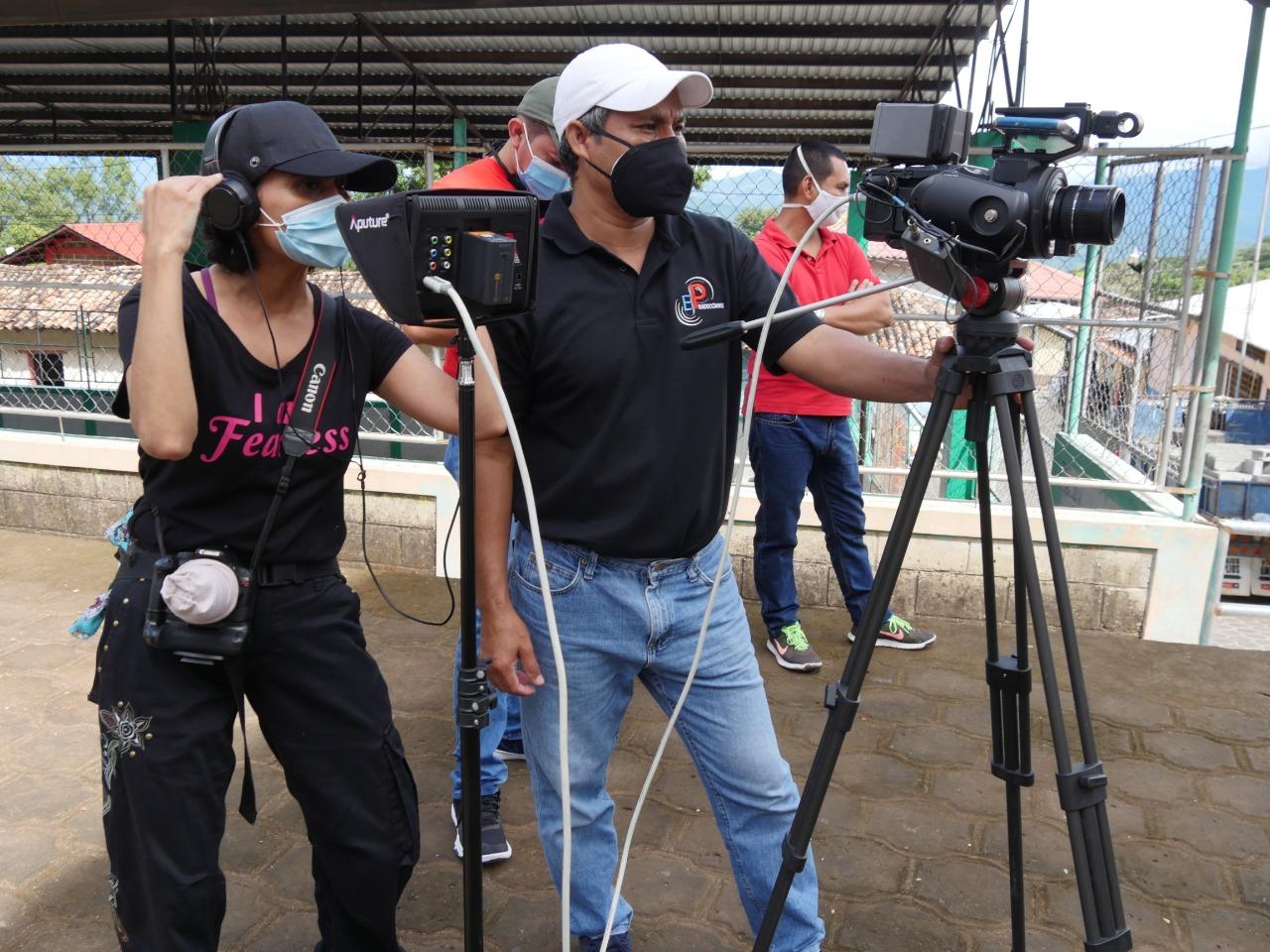Trained violence interrupters avert femicide in Honduras

CHOLOMA, Honduras - In Honduras, a Spotlight Initiative-supported partnership between UNICEF and Cure Violence Global is helping to identify and interrupt violence against women and girls (VAWG) through rapid response teams of ‘violence interrupters’. In 2020, 1,770 violent incidents were averted. A total of 65 per cent of cases involved the prevention of femicide. Violence interrupters spent over 43,402 hours working with women, men, girls and boys on social and gender norms changes.
Following an attack on her home, Alma and her two children found themselves in an unfamiliar neighbourhood, kidnapped and held hostage by a gang that had killed her husband. A common practice of gangs in Honduras, women and children often find themselves in the crossfire between rival gangs, neighbourhood disputes and other conflicts in their community. Honduras remains the most dangerous country for women in Latin America.
The plight of Alma and her children did not go unnoticed. A neighbour grew suspicious and reported to a local violence interrupter, who had been trained by UNICEF and Cure Violence Global to find ways to protect vulnerable women and children from violent situations. A strategy was put in place to get closer to Alma through a play activity that she would bring her children to one day. Once contact was made, Alma and her children were swiftly taken to a new home in a different city.
"We interrupted over 501 femicides through this violence interruption programme in 2020.” - UNICEF Child Protection Officer Nancy Zúñiga
Choloma municipality has long been a hot spot for crime and violence. In 2019, 38 women were reported to have died as a result of violence. In 2020, UNICEF Honduras reported that the number had dropped to 13 because of a committed team of violence interrupters like Flores and her colleagues, Luz and Pastora. Their methodology focuses on strengthening the capacities of individuals and community-based organizations to identify risk factors and to apply techniques that are proven to de-escalate violent situations.
“We interrupted over 501 femicides through this violence interruption programme in 2020,” says UNICEF Child Protection Officer Nancy Zúñiga. “It is based on a methodology that treats violence as an epidemic. It has been replicated in Mexico and Colombia. More recently, UNICEF has adapted it for combating gender-based violence and femicide specifically.”
The methodology emphasizes changes to social and gender norms and preventing violence by facilitating cooperation between stakeholders, increasing youth engagement and mobilizing the local community.
“I don’t care if it’s 1 a.m., 3 a.m., 5 a.m., anytime we get a call, we’re there.” - Flores*, violence interrupter
“I don’t care if it’s 1 a.m., 3 a.m., 5 a.m.,” says violence interrupter Flores*. “Anytime we get a call, we’re there.”
Since January 2020, violence interrupters have averted 1,770 highly volatile incidents involving more than 724 women and girls, in 25 neighbourhoods within Choloma and nearby San Pedro Sula. The cases have ranged from sexual violence to trafficking and exploitation. The lives of 501 women were saved. Violence interrupters also organized the relocation of 52 individuals, mostly women and children, to safer places.
Flores recalls one night when she received a call from a group of five women who were being harassed by a local gang in their community. They were being coerced into narcotic activities to avoid death and were given 24 hours to comply. Flores and other violence interrupters managed to transport the women away from the situation, providing them with temporary shelter in the private homes of various violence interrupters before the women were finally relocated to safer, more permanent homes. The women now no longer have to fear for their lives.
"We have gained credibility and people’s trust. We have slowly managed to change norms and behaviours." - Luz, Violence Interrupter
Changing social and gender norms forms the bedrock of this programme, particularly by encouraging people to reflect on the effects of gender inequality and harmful masculinity. Violence interrupters engage with their local communities to challenge negative stereotypes and confront discrimination, particularly among the younger population. Their efforts have managed to influence many boys and girls to become agents of change within their spheres of influence.
“We always begin with the women in a community,” says Ms. Zúñiga. “They take stock of the extent of violence and work out ways in which the methodology can be implemented. Understanding of local social and gender norms and buy-in from community members is critical to this intensive work. Implementation is also in the hands of local leaders.”
“Thanks to UNICEF and Cure Violence, through the Recuperando Mi Comunidad programme, we have gained credibility and people’s trust. We have slowly managed to change norms and behaviours,” says Luz, a violence interrupter.
In total, Flores, Pastora and Luz’s team spent more than 43,402 hours in 2020 working with their communities on social and gender norms changes. They have also followed up with 4,372 individuals after violent incidents – including 1,033 women and 1,219 adolescents – to ensure long-lasting behavioural change.
*Name changed to protect identity

